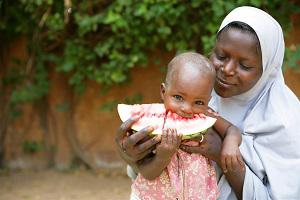
Five in six children under two years old are not fed enough nutritious food for their age, depriving them of the energy and nutrients they need at the most critical time in their physical and cognitive development, according to a new UNICEF report.
“Infants and young children have the greatest nutrient needs than at any other time in life. But the bodies and brains of millions of young children do not reach their full potential because they are receiving too little food, too late,” said France Begin, Senior Nutrition Adviser at UNICEF. “Poor nutrition at such a young age causes irreversible mental and physical damage.”
UNICEF data show that poor nutritional practices– including the delayed introduction of solid foods, infrequent meals and lack of food variety – are widespread, depriving children of essential nutrients when their growing brains, bones and bodies need them the most. The findings reveal that:
- Young children wait too long for their first bites. One in five babies hasn’t been fed any solid foods by the age of 11 months.
- Half of children aged six months to two years are not fed the minimum number of meals for their age, increasing their risk of stunting.
- Less than one-third of children in this age group eat a diverse diet – meaning from four or more food groups daily – causing deficiencies in vitamins and minerals.
- Almost half of pre-school aged children suffer from anaemia.
- Only half of children aged six to 11 months receive any foods from animal sources – including fish, meat, eggs and dairy - which are essential to supply zinc and iron.
- The high cost of foods from animal sources makes it difficult for the poorest families to improve their children’s diet. In Sub-Saharan Africa and South Asia, only one in six children from the poorest households aged six to 11 months eats a minimally diverse diet, compared to one in three from the richest households.
- Improving nutrition for young children could save 100,000 lives a year.
Making nutritious foods affordable and accessible to the poorest children will require stronger and more targeted investments from governments and the private sector. Cash or in-kind transfers to vulnerable families; crop diversification programmes; and fortification of staple foods are key to improving nutrition for young children. Community-based health services that help caregivers learn better feeding practices, and safe water and sanitation – absolutely critical in preventing diarrhoea among children – are also vital.
“We cannot afford to fail in our fight to improve nutrition for young children. Their ability to grow, learn and contribute to their country’s future depends on it,” Begin said.
Source: UNICEF
 FR
FR EN
EN AR
AR








